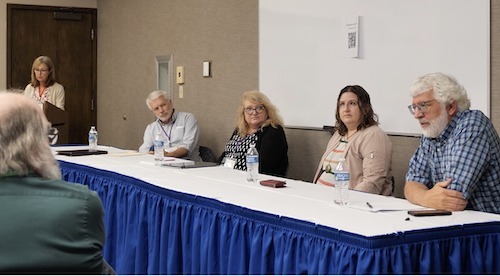
Annual Conference workshop: Guarded Hearts and Minds
“Rejoice in the Lord always. I will say it again: Rejoice! Let your gentleness be evident to all. The Lord is near. Do not be anxious about anything, but in every situation, by prayer and petition, with thanksgiving, present your requests to God. And the peace of God, which transcends all understanding, will guard your hearts and your minds in Christ Jesus.”
— Philippians 4:4-7
During the Dakotas Annual Conference in Mitchell, South Dakota, presenters gave Lunch-n-Learn Workshop sessions on both days of the event. On Friday, Diane Owen, area director for clergy well-being for the Dakotas and Minnesota Conferences, led a panel of experts in presenting “Guarded Hearts and Minds: Peace That Surpasses Understanding.”

Owen was joined by Rev. Sandee Prouty-Cole, a provisional deacon in the Dakotas Conference and currently serving part-time as a Hospice Chaplain for Avera@Home in Milbank, SD; Dr. Doug Anderson, a licensed psychologist and a licensed marriage and family therapist; Stephanie Moore, a licensed professional counselor with a focus on mental health; and Rev. Ron Olson, who currently serves as a counselor at The Becoming Agency and is an ordained elder in the Dakotas Conference.
Rev. Olson shared a few introductory words before Owen began the Q&A.
“We find it so easy to talk about our physical ailments and get help for whatever is going on in our bodies. But when it comes to our minds, we can’t go there. Fortunately, that is all changing now,” said Olson. “We’re beginning to see the advantage of being proactive in dealing with those things of our mental health, much like we do our physical wellness checks.”
Q: How do you guide clients to personally cope with the emotional toll of deep divisions?
“I think the best thing that I could offer is that we need to learn how to listen better—to listen without formulating our responses as we are listening. Just purely listen to what they are saying and then take it in,” Rev. Olson advised.
One of the participants asked, “Do you think there is a loss of faith through the disconnect and division that has happened?”
Moore answered, “Connection is the medium for sharing faith, encouraging each other, and feeling safe to talk about your faith. What I am finding is more people are terrified to talk about their beliefs. If you don’t have a community that you feel safe talking to, because of the divisiveness, you can lose your path, too.”
“One thing I try to remind people of is that we are all created in the image of God,” said Prouty-Cole. “Just because I don’t agree with you or you’re really mad at me right now, that doesn’t mean I’m not still called to love you and recognize that you’re a child of God also.”
Q: Have you encountered anyone in leadership roles who believes they are not fit for ministry because of the struggles they are encountering?
“The vast majority of ministry leaders belong right where they are, but they may not always have the best coping mechanisms. They sometimes doubt their own belief system and wonder why they have any authority to stand in the pulpit and preach when they feel that way internally,” said Anderson. “If we are not thinking about those things and processing that stuff, we are going to end up in a pretty cocky place. I would look at that kind of struggle as a good act of humility, and it comes with a great deal of self-awareness.”
A participant asked the panel to add to that by talking more about vulnerability.
“I think it is important to find a community that you can trust,” added Olson. “Trust is so important—to have somebody you can feel comfortable with.”
Owen also commented, saying, “I think we all need what I call the constellation of relationships. Not just clergy, but lay people too. You need work colleagues, your family, friends, and maybe professionals in your life. You need a constellation to support and surround you.”
Q: What can we do when we don’t feel okay, but we are expected to be okay because of our roles?
“The first thing that came to mind for me was to find someone to talk to. Don’t just isolate, because it is really easy to do that, but recognize when you’re doing that and get out and find someone to talk to. Then you can practice self-care,” said Prouty-Cole.

Q: When confronted with a traumatic situation, how do we move from simply dealing with the crisis to getting to a place of healing and renewal?
“Trauma is a different kind of stressor,” explained Anderson. “When you’ve been through a significant traumatic event, the amygdala lights up and the frontal cortex goes offline. The amygdala houses the fight-or-flight response in the brain, and it processes way faster than the frontal cortex. So, when something sets it in motion, the amygdala goes into safety mode before the frontal cortex can even think about whether it is in danger or not.”
“Another thing is that trauma disrupts your ability to connect to your higher power,” said Moore. “Trauma cuts off access to all the information that you know, that can help you. The good news about trauma is it can be rewired, and you can rewrite that story and it will still be the same truth.”
To conclude the panel, Owen asked each panelist to give one parting thought to the group.
“I would encourage you to just find a community that you can really be open with and trust,” shared Olson.
Prouty-Cole's one takeaway would be: “Just keep working on self-care and self-awareness. Be okay with not being okay, and advocate for yourself because you know what you need.”
“You are not broken. Your body is telling you that you have a story to share. You have pain that you need to work through, and your life depends on it,” said Moore.
Anderson leaned on the Sermon on the Mount, saying, “Blessed are those who mourn, for they will be comforted. Grief is a way of life, and we need to create opportunities in our own personal lives to grieve.”
For more information on well-being and conference resources, click here or contact Diane Owen.
Watch a recording of the workshop here.